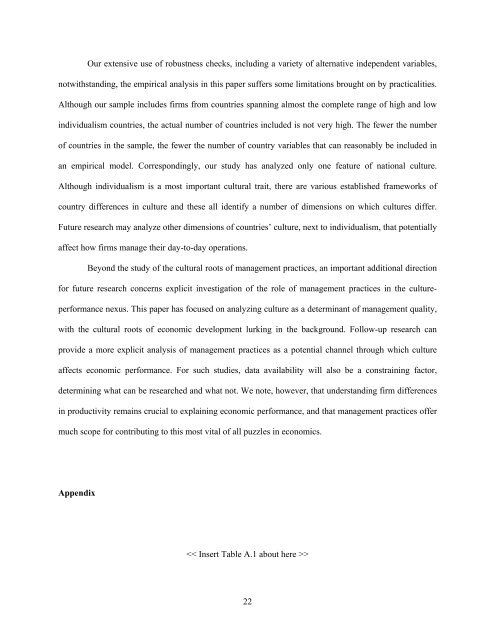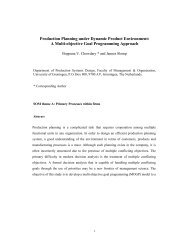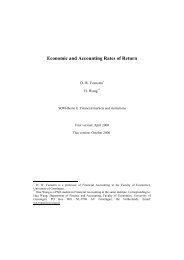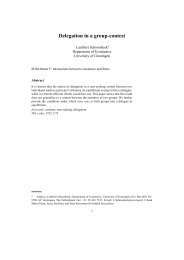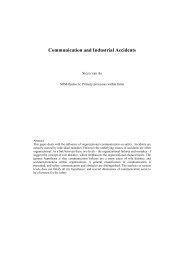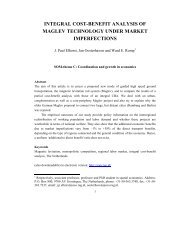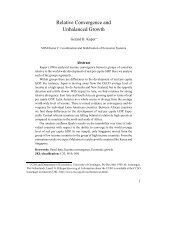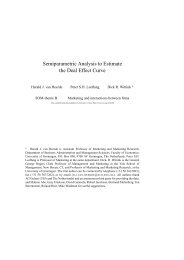Individualism and the cultural roots of management practices
Individualism and the cultural roots of management practices
Individualism and the cultural roots of management practices
Create successful ePaper yourself
Turn your PDF publications into a flip-book with our unique Google optimized e-Paper software.
Our extensive use <strong>of</strong> robustness checks, including a variety <strong>of</strong> alternative independent variables,<br />
notwithst<strong>and</strong>ing, <strong>the</strong> empirical analysis in this paper suffers some limitations brought on by practicalities.<br />
Although our sample includes firms from countries spanning almost <strong>the</strong> complete range <strong>of</strong> high <strong>and</strong> low<br />
individualism countries, <strong>the</strong> actual number <strong>of</strong> countries included is not very high. The fewer <strong>the</strong> number<br />
<strong>of</strong> countries in <strong>the</strong> sample, <strong>the</strong> fewer <strong>the</strong> number <strong>of</strong> country variables that can reasonably be included in<br />
an empirical model. Correspondingly, our study has analyzed only one feature <strong>of</strong> national culture.<br />
Although individualism is a most important <strong>cultural</strong> trait, <strong>the</strong>re are various established frameworks <strong>of</strong><br />
country differences in culture <strong>and</strong> <strong>the</strong>se all identify a number <strong>of</strong> dimensions on which cultures differ.<br />
Future research may analyze o<strong>the</strong>r dimensions <strong>of</strong> countries’ culture, next to individualism, that potentially<br />
affect how firms manage <strong>the</strong>ir day-to-day operations.<br />
Beyond <strong>the</strong> study <strong>of</strong> <strong>the</strong> <strong>cultural</strong> <strong>roots</strong> <strong>of</strong> <strong>management</strong> <strong>practices</strong>, an important additional direction<br />
for future research concerns explicit investigation <strong>of</strong> <strong>the</strong> role <strong>of</strong> <strong>management</strong> <strong>practices</strong> in <strong>the</strong> culture-<br />
performance nexus. This paper has focused on analyzing culture as a determinant <strong>of</strong> <strong>management</strong> quality,<br />
with <strong>the</strong> <strong>cultural</strong> <strong>roots</strong> <strong>of</strong> economic development lurking in <strong>the</strong> background. Follow-up research can<br />
provide a more explicit analysis <strong>of</strong> <strong>management</strong> <strong>practices</strong> as a potential channel through which culture<br />
affects economic performance. For such studies, data availability will also be a constraining factor,<br />
determining what can be researched <strong>and</strong> what not. We note, however, that underst<strong>and</strong>ing firm differences<br />
in productivity remains crucial to explaining economic performance, <strong>and</strong> that <strong>management</strong> <strong>practices</strong> <strong>of</strong>fer<br />
much scope for contributing to this most vital <strong>of</strong> all puzzles in economics.<br />
Appendix<br />
><br />
22


